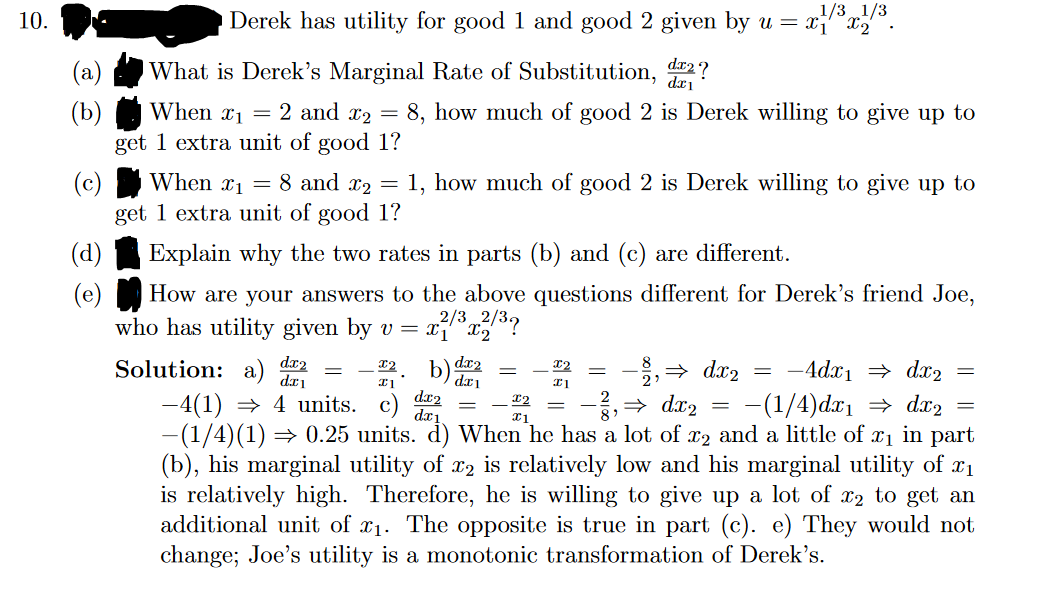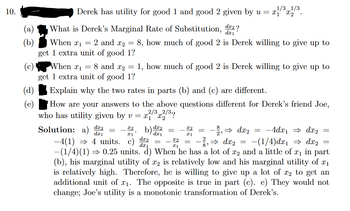(a) (b) (c) 1/3 1/3 Derek has utility for good 1 and good 2 given by u = x₁x₂. What is Derek's Marginal Rate of Substitution, d2 ? dx₁ When ₁2 and 2 = 8, how much of good 2 is Derek willing to give up to get 1 extra unit of good 1? = 8 and ₂ When 1 get 1 extra unit of good 1? = 1, how much of good 2 is Derek willing to give up to
(a) (b) (c) 1/3 1/3 Derek has utility for good 1 and good 2 given by u = x₁x₂. What is Derek's Marginal Rate of Substitution, d2 ? dx₁ When ₁2 and 2 = 8, how much of good 2 is Derek willing to give up to get 1 extra unit of good 1? = 8 and ₂ When 1 get 1 extra unit of good 1? = 1, how much of good 2 is Derek willing to give up to
Microeconomics: Principles & Policy
14th Edition
ISBN:9781337794992
Author:William J. Baumol, Alan S. Blinder, John L. Solow
Publisher:William J. Baumol, Alan S. Blinder, John L. Solow
Chapter5: Consumer Choice: Individual And Market Demand
Section: Chapter Questions
Problem 3DQ
Related questions
Question
can you explain how they got the answers here

Transcribed Image Text:10.
Derek has utility for good 1 and good 2 given by u = x1/³x/³.
(d)
(e)
What is Derek's Marginal Rate of Substitution, dr2?
When ₁ = 2 and x2 = 8, how much of good 2 is Derek willing to give up to
get 1 extra unit of good 1?
(c)
When x₁ = 8 and x₂ = 1, how much of good 2 is Derek willing to give up to
get 1 extra unit of good 1?
Explain why the two rates in parts (b) and (c) are different.
How are your answers to the above questions different for Derek's friend Joe,
who has utility given by v = x²/³x2/³?
Solution: a) dx2
X2
I1
dx2
X2
⇒ dx₂
dx₁
X1
-4dx₁ ⇒ dx₂
-4(1) ⇒ 4 units. c)
-(1/4) dx₁ ⇒ dx2
−(1/4)(1) ⇒ 0.25 units. d) When he has a lot of x2 and a little of x₁ in part
(b), his marginal utility of x2 is relatively low and his marginal utility of £₁
is relatively high. Therefore, he is willing to give up a lot of x2 to get an
additional unit of x₁. The opposite is true in part (c). e) They would not
change; Joe's utility is a monotonic transformation of Derek's.
dx2
dx1
=
X2
I1
→dx₂
-
=
=
Expert Solution
This question has been solved!
Explore an expertly crafted, step-by-step solution for a thorough understanding of key concepts.
Step by step
Solved in 5 steps with 13 images

Follow-up Questions
Read through expert solutions to related follow-up questions below.
Follow-up Question
can you now solve part d and e

Transcribed Image Text:10.
(a)
(c)
1/3 1/3
Derek has utility for good 1 and good 2 given by u = x₁x₂
dx2?
What is Derek's Marginal Rate of Substitution,
When 1 =
2 and 2
8, how much of good 2 is Derek willing to give up to
get 1 extra unit of good 1?
=
When 1 = 8 and ₂ =
get 1 extra unit of good 1?
Explain why the two rates in parts (b) and (c) are different.
How are your answers to the above questions different for Derek's friend Joe,
who has utility given by v = x²/³x2/³?
Solution:
dx2
dz₁
1, how much of good 2 is Derek willing to give up to
dx2
dx₁
x2
I1
−4(1) ⇒ 4 units. c) da
⇒ dx₂
-4dx₁ ⇒ dx2
-(1/4)dx₁ ⇒ dx₂
-(1/4)(1) ⇒ 0.25 units. d) When he has a lot of x2 and a little of x₁ in part
(b), his marginal utility of x2 is relatively low and his marginal utility of x₁
is relatively high. Therefore, he is willing to give up a lot of 2 to get an
additional unit of ₁. The opposite is true in part (c). e) They would not
change; Joe's utility is a monotonic transformation of Derek's.
X2
x2
I1
=
⇒ dx₂
-
=
=
=
Solution
Knowledge Booster
Learn more about
Need a deep-dive on the concept behind this application? Look no further. Learn more about this topic, economics and related others by exploring similar questions and additional content below.Recommended textbooks for you

Microeconomics: Principles & Policy
Economics
ISBN:
9781337794992
Author:
William J. Baumol, Alan S. Blinder, John L. Solow
Publisher:
Cengage Learning


Principles of Microeconomics
Economics
ISBN:
9781305156050
Author:
N. Gregory Mankiw
Publisher:
Cengage Learning

Microeconomics: Principles & Policy
Economics
ISBN:
9781337794992
Author:
William J. Baumol, Alan S. Blinder, John L. Solow
Publisher:
Cengage Learning


Principles of Microeconomics
Economics
ISBN:
9781305156050
Author:
N. Gregory Mankiw
Publisher:
Cengage Learning

Principles of Microeconomics (MindTap Course List)
Economics
ISBN:
9781305971493
Author:
N. Gregory Mankiw
Publisher:
Cengage Learning


Principles of Economics, 7th Edition (MindTap Cou…
Economics
ISBN:
9781285165875
Author:
N. Gregory Mankiw
Publisher:
Cengage Learning